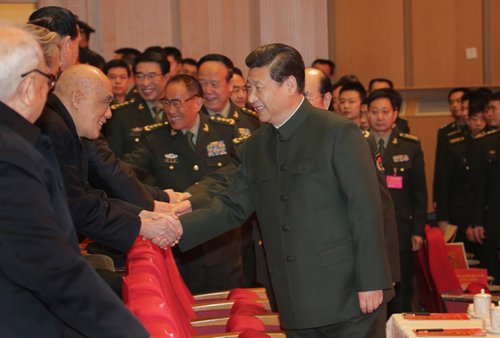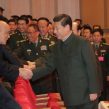
Can Xi Jinping Grow Political Power Out of the Barrel of a Gun?
Publication: China Brief Volume: 13 Issue: 4
By:

The Chinese Communist Party (CCP) leadership transition from President Hu Jintao to Vice President Xi Jinping has proceeded at a breakneck pace and, arguably, not since Deng Xiaoping have the levers of power been so concentrated in one leader’s hands. Deng’s strength came from his unique set of personal relationships at the party and the military’s top echelons. Although he belongs to an elitist coalition built upon ex-CCP General Secretary Jiang Zemin’s “Shanghai Faction,” Xi is not necessarily of Jiang’s faction and, like his predecessor, may be another “first among equals.” The question is does Xi need to create a personal power base—or faction—at the center and, if so, how can he leverage his institutional positions to create it. Because Xi simply cannot exploit the security forces and investigative apparatus for personal motivations, consolidating political influence becomes a function of using policy to bind others to him and isolate potential opponents. This factions-based approach suggests analysts should look for the political motivations behind Xi’s new initiatives rather than succumbing to cynicism about the latest anti-corruption drive that seems destined to fail without structural political reform.
Xi appears to have gained control over several of the important “mountain tops” (shantou) in the party and the security services, ostensibly giving him control or influence over a number of traditional levers of power. The smooth transition of the Central Military Commission’s chairmanship to Xi’s hands and Central Discipline Inspection Commission Secretary Wang Qishan’s general alignment with the princelings already are well known. The demotion of the Central Political-Legal Committee (CPLC) secretary position to the Politburo level and the seeming political weakness of the otherwise powerful minister of public security may have given Xi more influence over law enforcement and domestic intelligence than he would have had under normal conditions (“New Police Chief Shows Reliability But Not Power,” China Brief, February 1). Moreover, speculative but plausible news coverage from Hong Kong suggests CPLC chief Meng Jianzhu may be reporting directly to Xi (Ming Pao, January 30). Evidence of Xi’s role overseeing the political-legal apparatus should become solid if he takes over some of the leading small groups previously held by Zhou Yongkang, the last CPLC chair.
Xi also seems to have gained a position of substantial influence over the People’s Liberation Army (PLA) and People’s Armed Police (PAP) far earlier than his predecessor; while ex-President Jiang Zemin finally has stepped aside—perhaps with a little push. Since the 18th Party Congress, Xi has been making the rounds to inspect PLA and PAP elements, and each time he has been surrounded by the most senior and appropriate officials. Hong Kong observers suggested Xi’s intense schedule was a sign of how much value he places on his relationship with the PLA (Ta Kung Pao, February 4). For example, visiting PAP elements in Beijing, Xi brought along the CPLC Secretary Meng, Minister of Public Security Guo Shengkun as well as CMC Vice Chairmen Fan Changlong and Xu Qiliang (South China Morning Post, January 30; Global Times, January 30). Similar inspections have included bases from each of the PLA’s three services and one branch (Xinhua, February 6; Global Times, February 5; Xinhua, December 5, 2012).
Although former president Jiang and President Hu have pledged to remain aloof from party affairs, Xi may have helped ease Jiang out. Reportedly, Xi was not expected to attend the funeral of General Yang Baibing, but made a surprise appearance anyway (Duowei News, February 1). The innocent explanation is that Xi’s father, Xi Zhongxun, had ties to the Yang family, particularly the older brother ex-President Yang Shangkun, who had worked closely on reform with Xi Zhongxun. The less benign explanation is that Xi was setting out to distinguish himself from Jiang Zemin, who narrowly survived an attempt by the Yang brothers to usurp his position as general secretary in the early 1990s. Though speculative, this latter interpretation is bolstered by Jiang’s concurrent demotion in published protocol order of ranking CCP cadre (Xinhua, January 21). With the CMC chair in hand and Jiang apparently stepping back, soon-to-be President Xi—at a minimum and unlike Hu—almost certainly will not have his predecessor breathing down his neck in military affairs.
Using a factional lens calls for a reevaluation of Xi’s anti-corruption and personal austerity drive as well as his suggestion that the party needed to be willing to accept sharp criticism (Xinhua, February 7). As the emphasis on understanding Chinese factions has declined as an analytical tool, the tendency is to examine these initiatives as regular public policies that can be assessed on their achievement of objectives, e.g. reduction of graft and ostentatious government spending. Factionalism, however, offers a different way to examine Xi’s new initiatives. Although scholars have disagreed over the composition of factions, most analysts agree factions are usually tacit in nature and become more so the further away from the factional core an official gets. Policy announcements consequently can be used as trial balloons to test the strength of a faction and/or leader by seeing whether lower-level officials will act.
With the appearance of party unity and adherence to party discipline paramount, some initiatives that are politically sensitive, such as anti-corruption drives, can be and have been used as political tools to bring down competitors. For example, Hu Jintao used a combination of corruption investigations and institutional discipline to bring down Shanghai Party Secretary Chen Liangyu in 2006. The official justification for Chen’s removal emphasized his departure from CCP-approved behavior rather than any animus from Hu (“The Soapbox and the Truncheon: Hu Jintao’s Amorphous Power,” China Brief, July 19, 2012; Xinhua, September 26, 2006).
Xi’s call for corruption investigations to capture low- and high-level cadre (“flies” and “tigers,” respectively) and to enforce clean government could have factional undertones (Xinhua, January 22). His influence over the investigative apparatus allows him to push for selective enforcement and protect those closest to him. Those outside Xi’s elitist coalition, however, face tough choices: either cooperate, reinforcing the perception Xi’s power, or resist, violating so-called “party discipline” and potentially opening oneself up to attacks from ambitious lower-level officials. With many of outgoing-President Hu’s protégés set for advancement and the senior-most leadership positions in the next party congresses, the danger of being caught out in this delicate dance between cooperation and resistance is real (“Communist Youth League Clique Maintains Clout Despite Congress Setback,” China Brief, November 30, 2012).
Looking back at the emergence of new factional groups, it seems too early to say that Xi is running his own faction that dominates Chinese politics; indeed, he may even lack a party-based coterie (“All the General Secretary’s Men,” China Brief, February 15). Although many of Xi’s fellow Politburo Standing Committee members probably are sympathetic to his statist objectives, the princeling-dominated party center does not necessarily give Xi himself overwhelming authority (“China’s New Leaders to Strengthen the Party-State,” China Brief, November 30, 2012). He needs the opportunity of the 19th Party Congress in 2017 to promote loyalists to the Politburo and its standing committee as Jiang did in 1997 and Deng Xiaoping did during the personnel reshuffles of the late 1970s. Until then, Xi sits at the apex of power with the levers in hand. The test of whether factionalism continues to explain Chinese politics will be how well the prominent China Youth League (tuanpai) figures—Li Keqiang, Hu Chunhua, Sun Zhengcai and Zhou Qiang—fare in the next ten years. If the institutionalization of Chinese politics really is proceeding apace, these figures should rise to the top at the next two party congresses. With so much power seemingly concentrated in Xi’s hands, the question becomes whether CCP norms or factional politicking will rule the day.





